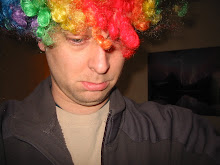So here's a question: Given that ghosts in AD&D/OSRIC age the people they touch by 10-40 years, if they touch a little kid, does the little kid stay the same size but just get older looking - like a freaky hobbit without hairy feet? Or do they suddenly actually grow in size and their clothes shrink and rip accordingly?
I mean, if their bodies grow, then there's a kind of polymorph thing going on and it just seems very odd or really fantastic somehow (of course, so is magical aging itself). Let’s say that physical growth does occur - might you end up with middle-aged adults whose language and demeanor is that of children? Another option with that approach might be that they’ll stop behaving like a child after a number of years go by that had originally been left to their youth, before it was stolen. Or would they magically and instantly advance in age and size and become the adults that they were destined to become in personality, simply missing the decades of life's experiences that they would have had? I suppose these other options might not be dependent on whether they grow in size or not.
I asked my wife and she chose the freaky hobbit option. She found the idea of a change in size to be silly, and in fact said that the child would not grow in size with natural aging either - that they’d be stuck in that small physical form for the rest of their lives. Crap. I don’t know why I hadn’t thought of that option. At least she indulges my occasional important question from left field.
I started to actually chart the possibilities to make a vote easier and to clarify it for myself, or even to have a table to roll on, but I just confused myself more in the attempt.
Personally, I like the idea of a more powerful ghost that robs children of their adulthood forever, but traps them in an adult body. It’s tragic, and makes for a good NPC.
ASC Review: Pyramid of Peril
55 minutes ago







7 comments:
I agree with your wife... freaky hobbit option seems the most eerie. I suggest you call it "The Gary Coleman effect."
I think you hit on something really interesting here. I think a natural tendency would be to define what happens in the case of kids aging-- to make a rule.
But as a DM I would want both options for different effects. Old Hobbit Syndrome seems like it would be horrifying to watch-- before your eyes the child full of promise withers into some wizened husk, you'd want to try to stop the process attack the ghost, keep it from touching any more kids.
The child in a grown up body is more tragic when you realize how lost they are, how their mental age might never catch up to their body's age. I think it would be creepier if those facts slowly dawned on you.
How horrible and creepy. It pains me to think of it. That's why it would be such a powerful addition to a game - if used sparingly. Then again, I can totally imagine a ghost-haunted orphanage... That would be gut-wrenching.
I always assumed it was not literal aging so much as the terror of the ghost shaving 40 years off of your life. The kid might have chills and agues for the rest of his life, but look almost normal except for the haunted expression in his eyes and the hair that turned stark white overnight.
I'm thinking just physical aging rather than growth, too.
The real world equivalent you are looking for would be progeria, which is seriously depressing.
An interesting twist would be to rule that if a character is magically aged by a ghost a number of years beyond the character's current age, new "life" experiences are implanted in the character which are taken from the ghost's past life.
Yeah - I think progeria might be responsible for legends of changelings.
Also the situation reminds me of Alan Moore's "naturalistic" take on the child Billy Batson regularly turning into the adult Shazam, as the climactic reveal of his never-published series Twilight of the Superheroes. Any way you slice it, it's kind of messed up...
Post a Comment